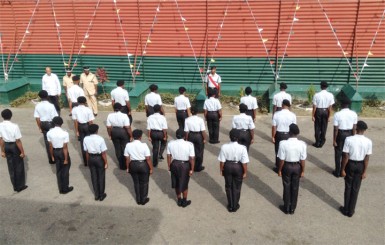There are 25 new additions to the ranks of the Guyana Prison Service with the conclusion of its latest Basic Recruit Training Course and Home Minister Clement Rohee has warned them to be wary of their behaviour due to media scrutiny of the security sector.
The media, Rohee told the recruits at their graduation yesterday, is going after information to make the security sector “look bad.”
“Anything negative that they can put their hands on, anything negative they can find – particularly in respect to the Georgetown Prison – trust me, it will be published…it will be published to make you look bad,” he noted.
The recruits, drawn from the Corentyne, Linden, Timehri, George-town and other parts of the country

and split evenly between genders, began four months of gruelling training in October 2013 and completed the course on Tuesday.
The programme had initially registered 26 recruits; however, two dropped out. Out of the remainder, 23 out of 24 were successful, while two recruits from a previous course also rewrote the final examination and were successful.
Speaking at the graduation yesterday afternoon, Olivia Cox, Assistant Superintendent of Prisons noted that the recruits were exposed to a number of practical exercises, such as drills, physical training, and firearm use as well as lectures and presentations on the prison service and its roles to society.
Certificates were awarded to all of the successful recruits and special awards were given in areas such as best student, most improved student, best drill student and best dressed student.
Despite the successes of the programme, Cox said it needed improvement, including a higher budget allocation.
Director of Prisons Welton Trotz urged the recruits to ask questions and seek the guidance of superiors to continue learning.
Rohee echoed Trotz’s advice, reiterating that guidance by superior officers is necessary if the Guyana Prison Service is to move towards correction and rehabilitation.
According to Rohee, the new officers are entering the prison service at an exciting time when the service is in the process of modernising itself.
It was revealed that the service will be placing greater emphasis on the correction and rehabilitation of prisoners with special needs, including drug addicts and the mentally unstable.
The training programme was the second of its kind conducted in 2013.





